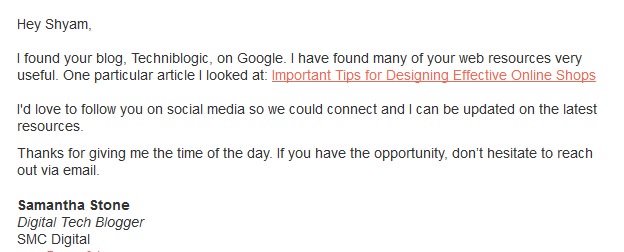Are you a blogger following strict content schedules? Do you use Blog Posts social scheduling plugin (like TweetBoostPRO) to get your words viral on social media? Are your blog topic ideas imposing?
If your answer is a YES, you are doing it in a good way as:
- Dominant presence on social media is directly correlated with better search rankings.
- Top rankings are correlated with LinkedIn, FB, Twitter, and Pinterest shares utterly.
- On an average, the content length of top 10 organic results is higher than 2K words.
But despite having great content and high social count, if your blog doesn’t have significant organic count (referred from search engines), you need to pay close attention to two areas:
1) Technical
2) Inbound Links
I’m not covering technical SEO optimization area in this post, but this post by Neil Patel will give you a fair idea for the major on-site improvement.
This post will cover the second area in detail. Let’s start!
Content and Links are Everything – Acknowledge the Fact and Gear Up Your Blog Marketing Strategy.
John Mueller’s answer was epic when a Twitter user asked him the following question:
“What’s the main important factor for ranking a website in top search results?”
John Muller – “Awesomeness.”
Google’s representatives are always smart when answering on public platforms and don’t make “to-the-point” responses related to their search algorithms.
Gary Illyes – “It depends on the query and the results which signals count more.”
But we can digest the fact based upon recent major studies and surveys taken out by industry experts.
- SEM Rush tested out a high volume data (of web pages) and concluded that the web page ranked on the 2nd position has 10K more referring domains than a web page ranked at the 10th spot.
- The web page ranked at the 1st position has 2.2 times more backlinks than the web page ranked at 2nd spot. (SEM Rush)
- In 2016, Brian Dean analyzed one million search results and found the correlation between the number of referring domains and Google rankings.
So, Do you agree?
Without amazing content, you’ll never be able to earn links. And without acquiring powerful links, you wouldn’t get your spot on Google’s first page.
Generating amazing content is the first requisite of any blog in any niche. That’s why blogs allowing guest contributors focus heavily on the editorial process.
#1. Do Research. Extensive Research. You don’t need to say YES to every linking opportunity.
I am aware of cheap linking services available at Fiverr, Freelancer, and Upwork. In fact, I used to hire them to get 100s of forum profile, blog comment, and bookmarking links. But I stopped using this non-sense service five years ago. These links do not matter.
Sometimes, it’s hard to say NO to them, especially, when a freelancer claims to get you EDU or GOV links, at a really low rate.
But your Blog link placed on these profiles don’t get you any visits and thus, any conversion. Then, what’s the benefit of buying them? Do you aim to have EDU and GOV links in your link profile? That’s it? No, I don’t think it’s worthy.
Also, submission to general web directories (believe me, they can be toxic elements in your link profile), social bookmarks, profile links, forum signatures, link exchanges, and reciprocal ones are the old school
Before placing a link, think of following things:
- Is this website and web page specifically, ranking well in Google? Maybe not this time, but can it perform well in the near future?
- Will this link add value to the page and readers?
- Can I get some real visits from this particular link? It shouldn’t cost me bounce backs.
This sort of pre-link-building analysis will save your efforts and time not moving into not-the-best resources.
I always listen to my friend’s (Richard Barker) advice in designing and implementing impactful link campaigns, and he says – “Be very selective and never be in a hurry when it comes to building real links. At the end of the day, creativity with quality will always win”.
#2. Keep your close eyes on Guest Blogging opportunities.
When I recommend Guest Blogging as one of the concrete ways to build real links, make sure I’m not referring to the blogs which were built only to have guest posts.
Make a Google search for queries like Branding “write for us”, or Business “write for us”. You’ll see plenty of blogs where every other post is made out there by another guest blogger.
This way, Guest Blogging becomes a vague trick to get easy backlinks and doesn’t add expected link value. Everybody is chasing out for Guest Post links, and this made
I had gone through all this in the past, and random guest post campaigns did cost me negatively for this agency website.
I wish I could apply link diversity in this campaign at that time. Results would surely be different that way. Leaders like Joe Balestrino don’t count every website in their list. I read Joe’s columns on Search Engine Journal, Personal Branding Blog, and 4PointDigital and he loves to be interviewed rather than participating in a guest column. Joe’s approach takes me to the next phase in this list – Interviews.
#3. Apart from Guest Posting, Do Some Interviews and Podcasts.
Many bloggers,
At the times when you are so busy with generating guest post content and infographics for very authoritative websites, going for an interview and answering hardly 10 to 15 questions online can bring you a couple of editorial links to your blog and social profiles.
You can find such blogs with simple Google search like below:
We talked about Joe earlier, here is one of his interviews:
Expert roundup posts are another hot trend in the blogging sphere. You can take a seat and answer your opinion on the asked questions. The moderator accepts your answer, and you’ll get a link. It’s that simple!
But how can you be aware of such possible future round-ups?
- It’s not that easy. You need to be in touch with other bloggers, influencers, and bloggers who regularly do roundup posts. Also, subscribe to MyBlogU application. It will be a good help.
- Minuca Elena is a roundup posts star. I’ve been a part of one of her roundup posts published at DA>50 blogs. I’m not sure, but if you pitch her, she can keep you informed about her coming posts. You can get cited.
- Search for similar professionals in your industry and make a connection with them.
A useful application – Help A Report Out
To get cited as the information source and probably link backs, HARO is a great tool. It is a platform where a lot of journalists come to get citations for their stories. You need to subscribe to them as a source for reporters to use in their coming stories, and quickly respond when they come to you.
#4. If possible, hire a PR guy, link builder or similar service.
I know that you already know it and this will not be in the budget for most of you, especially if you are a small blog with limited monetization.
This option works best for corporate blogs where they need to spread the word about their products or services.
I would rather count niche based bloggers and influencers in this list. Search for Shopify review, Weebly review, or SITE123 reviews; you’ll see tons of blog posts written about them. This was their marketing attempt, and they paid bloggers for these reviews.
I don’t want to promote any friend here, but I get offers from some guys claiming to feature me on Huffington Post, USA Today, and Forbes. I can’t cite anyone here because I haven’t used them yet. They aren’t cheap. At $40 spend, I can expect 12 × Bottle 710 ml beer, not a link from Forbes J
#5. Friends Bloggers can do the work for you.
Let’s see an example – A PR guy can’t get an editorial link from Neil Patel’s blog. Neil doesn’t allow anyone to write a guest column on his personal blog, so it’s nearly impossible to get one. But the guy I’m talking about is a friend of Neil. And Neil mentioned him in his recent post along with offering him a do follow link. It’s all about connections. Isn’t it?

Established bloggers do have connections. Thus, they seem to earn links naturally from friends and fellow bloggers.
If you are pretty new to blogging, you should build a rooted relationship with other bloggers. Social media, personalized emails, blogging platforms, and blog post comments will allow you to get interacted with each other.

Introductory messages on social media can lead a business relationship later on.
#6. Syndicating your blog posts
Syndicating your content is one of the easiest ways to earn links from powerful domains. Business 2 Community, Medium, and LinkedIn Pulse allow content syndication. The fact that I like about it most? It doesn’t take much time.
You’ll start seeing new backlinks in your Google’s referring domains list pretty soon.
The strategy works most of the times because you know it pretty well:
More Pageviews = More Links
When you hit a new blog post, third-party websites can publish your post on their blog, pointing a link to the original source. I see it on every other blog for infographic post specifically.
#7. Competitor Analysis
Regularly checking link profiles of your competitor blogs will give you the hidden gems of link building. It might be a resource link, a highly related niche-based directory, a guest post opportunity or even a syndication resource. When you follow and check the profile of a star blogger, you find something worth following and worth repeating.
You will need link explorer applications in this phase.
MOZ’s Link Explorer, SEM Rush, Ahrefs, Monitor Backlinks, and Link Assistant Pack are accurate tools in this list.
When you see where their links are coming from, this can give you an idea of where you should be looking too. Getting links from the same sites can help you compete in the search engines, but beyond that, can expose you to similar audiences of potential customers.
#8. Do Branding. Be Discoverable. Rank your blog posts.
You are outreaching a guy who you don’t know personally but what if that guy already knows you? Half of your work will already be done in that case. And success rate? Becomes 3x.
You need to become recognizable that way. Your outreach results, link reclamation, and guest posting chances will become substantially high.
You also need to have tons of evergreen content that people might like link out from their content.
A Post like ‘2017 Web Designs Trends’ would barely get any attention in 2018 and beyond. That’s not the evergreen piece.
This post from Genie Recycling is precisely the type of content I’m pointing out here. This will do perform socially and organically even five years later.
Once you’ve prepared these power pages on your Blog, market them strategically. Go over all social, search and usability signals to rank these posts incredibly well in Google. This will automatically bring natural inbound links to these posts from diverse sources. Links from different regions, different extensions, on varied anchors – That’s the phase where you don’t need to do Link Building your own. You’ll frequently get natural links without putting your efforts on it.
Over to You
Your blog’s link profile wouldn’t improve magically overnight. It will take time (months or years) to build some reputation on the web. And that’s fine. Every successful blogger has gone through this. Be patient, persistent, learn from senior bloggers’
What’s working for you? What was your prominent source of getting backlinks? I would love to hear your winning strategies!


